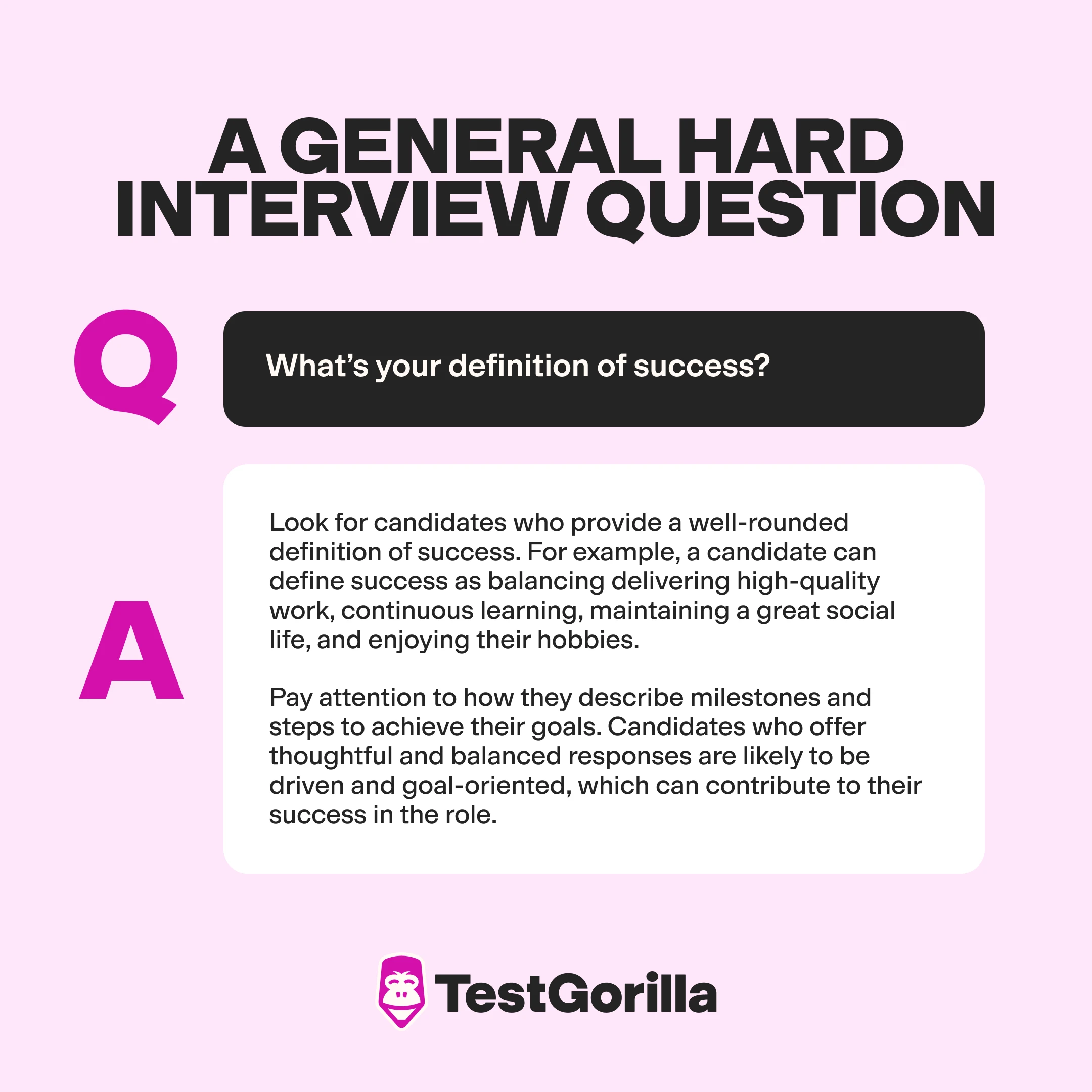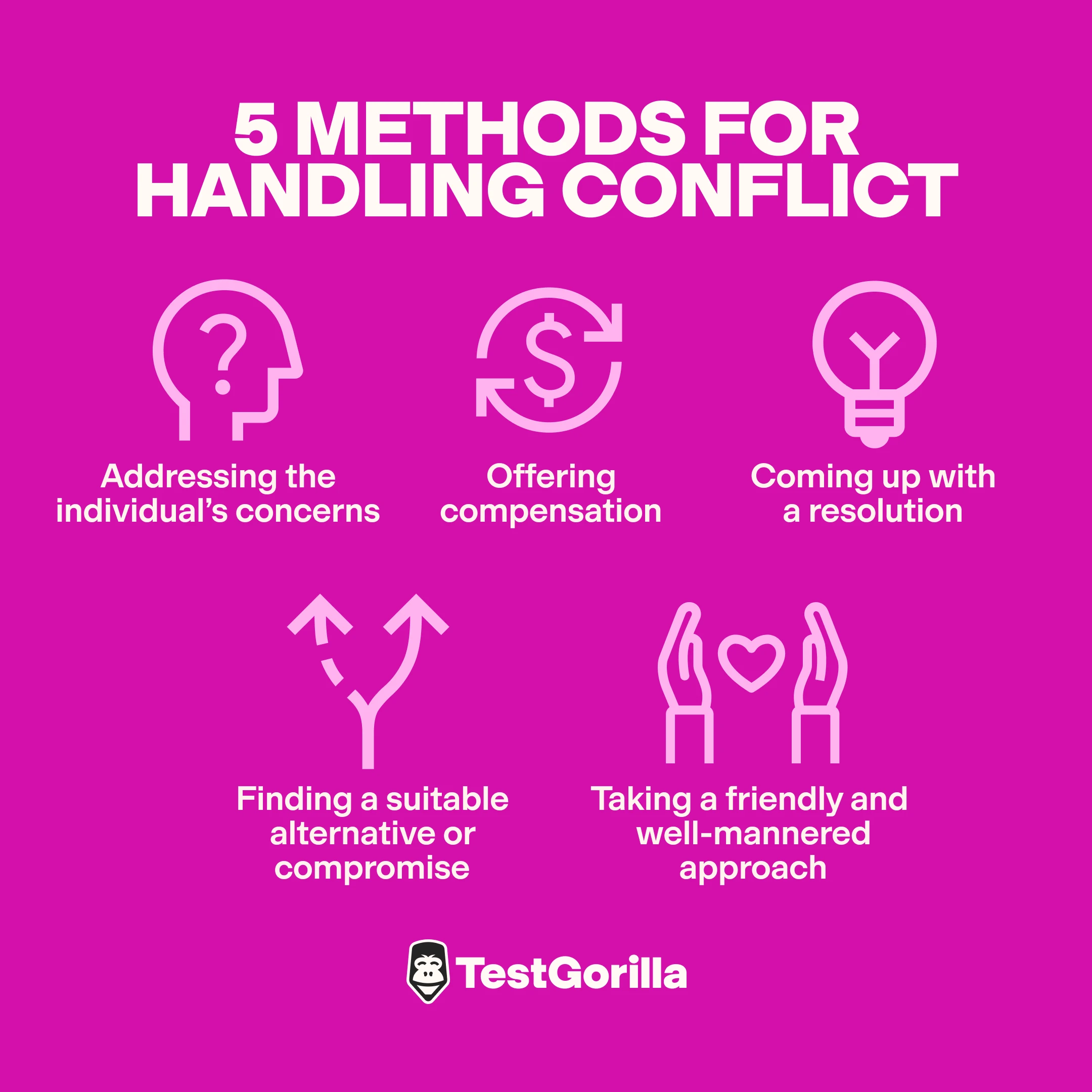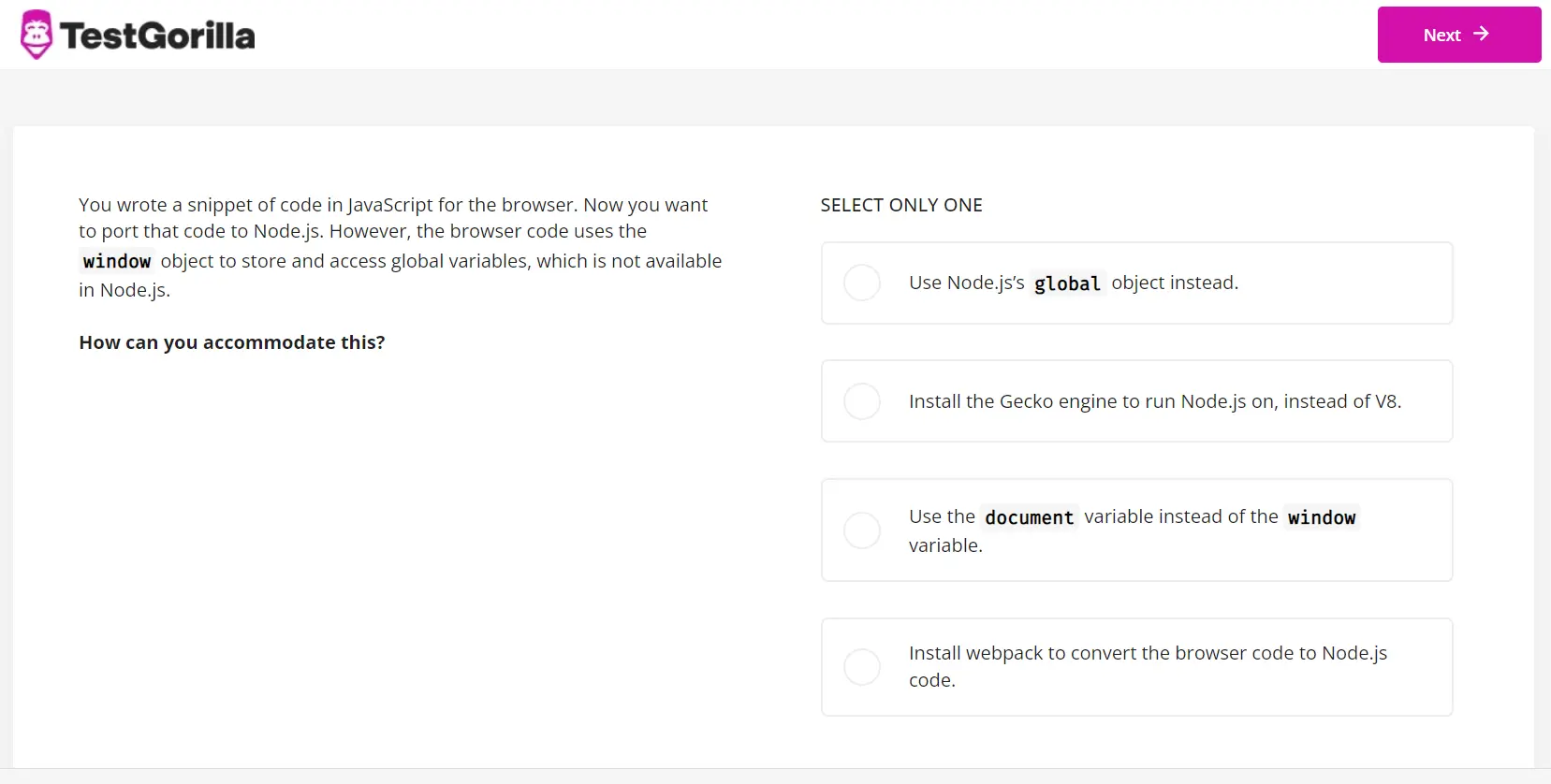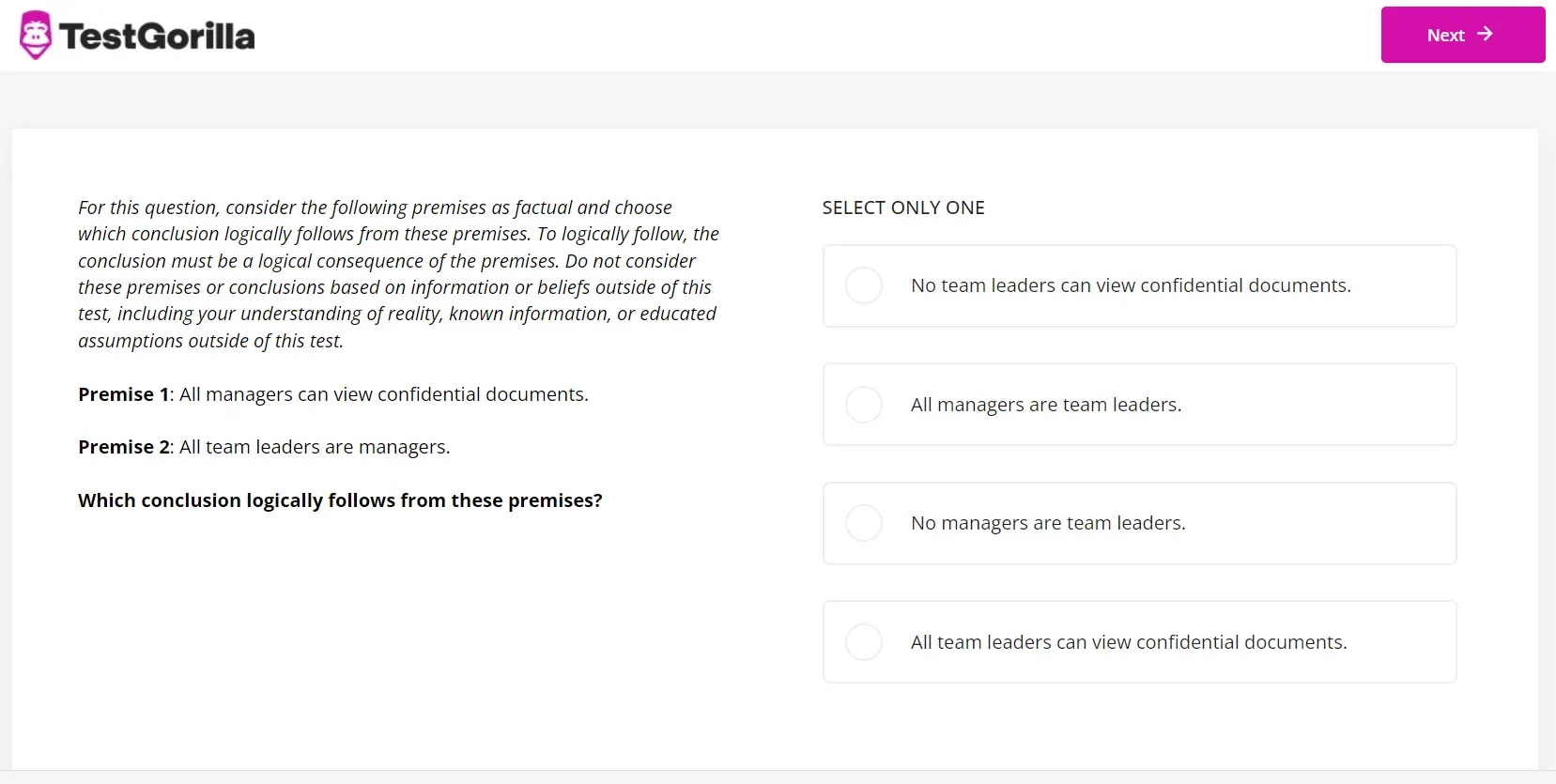23 hard interview questions to ask candidates and assess their skills objectively
Looking for a more objective way to evaluate your candidates?
The traditional interview process is time-consuming and often fails to reveal a candidate’s true potential. This inefficiency usually leads to poor hiring decisions and high turnover rates.
Hard interview questions and answers help you identify applicants who can perform their jobs well. Combining these complex interview questions with talent assessments is the best approach to make your hiring process more efficient.
In this article, we review 23 hard interview questions to ask candidates to better understand their skill sets, personalities, and motivations.
Table of contents
- A summary of all 23 difficult interview questions
- 8 general hard interview questions and answers
- 8 hard interview questions to ask candidates about work behavior and attitude
- 7 challenging interview questions to ask about skills and competencies
- Pair hard interview questions with talent assessments
- Find the best candidates with the hardest job interview questions and talent assessments
- Difficult interview questions to answer FAQs
A summary of all 23 difficult interview questions
Here’s a comprehensive overview of the 23 hardest interview questions to ask candidates, ensuring you have an easy-to-copy list for your hiring process:
1. What have been your greatest accomplishments?
2. What do you like about our company and the work we do here?
3. Why did you choose to apply for this vacancy?
4. How do you expect your day-to-day to look in the position?
5. What are you passionate about?
6. What’s your favorite movie, and why?
7. Can you tell me one thing you would change about your last job?
8. What’s your definition of success?
9. Name the least rewarding part of your most recent role or project.
10. Have you ever had a supervisor question one of your decisions?
11. What do you do if you receive the same negative feedback twice?
12. Is it more important to complete tasks well or quickly so you can meet a deadline?
13. Provide some of your methods for handling conflict.
14. Do you prefer to work independently or in a team?
15. Do you prefer self-directed work or clearly defined tasks?
16. What type of manager would you never want to work for?
17. How do you deal with completing fast-paced work duties?
18. Which methods do you use to learn about new trends in our industry?
19. Can you name one skill that makes you a unique candidate?
20. Can you describe a skill you need to improve?
21. Are there any methods you prefer for upskilling?
22. What are your greatest professional strengths?
23. How do you innovatively solve challenging situations?
Now let’s explore them one by one.
8 general hard interview questions and answers
It’s crucial to ask the hardest interview questions to identify the most qualified candidates. This section provides eight general hard interview questions and answers to help you uncover the applicants’ true potential.
Feel free to incorporate some of these difficult interview questions into your process to make more informed hiring decisions and ensure you select the best talent for your organization.
1. What have been your greatest accomplishments?
This question helps you understand what an interviewee values the most.
The candidate can focus on their career goals, such as completing a major project, leading a successful team, or overcoming significant obstacles. They can also discuss something personal, like raising children, charity work, or overcoming a huge hurdle.
Look for candidates who clearly explain their greatest accomplishments and show pride. Pay attention to what they learned from the work experience and what skills they used or developed.
2. What do you like about our company and the work we do here?
By asking this interview question, you can learn if your applicants researched your business, which gives some indication of their motivations, passions, and genuine interest in the job. Look for answers related to your company’s:
Goals
Values
History
Services
Management style
Reputation and feedback
It’s important to remember that even after completing research, candidates don’t know everything about your organization. However, this is not a major issue – as long as they are genuinely interested in what you do.
3. Why did you choose to apply for this vacancy?
This question evaluates candidates’ thought processes about your job opening and their understanding of the job description. In addition, it tells you whether the applicants took the time to research the company before the interview and understand what you expect of them.
The top answers to this question should mention:
Your applicant’s desire to complete new challenges
Your organization’s brand reputation and professionalism
Your candidate’s transferable skills that align with your open role
4. How do you expect your day-to-day to look in the position?
This question has no right answer but can reveal what your candidate knows about the potential new job.
You can follow up by asking the candidate which elements of the role they expect to enjoy and which they expect to struggle with. Their answers can reveal self-awareness and areas where they need additional training or support.
The follow-up questions help you identify potential training opportunities and evaluate how receptive applicants are to career development.
In addition, most candidates don’t expect this question in the interview, so you can see how quickly they think and perform in a high-pressure environment.
5. What are you passionate about?
If you ask your candidate this question, you can gain insight into their interests in and outside of work. Answers to this question also show how conversational your candidate is, which is an important trait for client- or customer-facing positions.
Some applicants could discuss side projects they’re passionate about, such as application development or blogging. Others can reveal a specific skill by mentioning personal projects.
No matter the answer, they should be enthusiastic and relaxed when talking.
6. What’s your favorite movie, and why?
This question should lighten the mood and encourage your candidate to open up more than a generic question like, “Tell me about yourself.” That way, they can get more comfortable answering specific questions.
Their favorite movie can tell you something about their interests and personality. Their answers' length, depth, and engagement also reveal how articulate they are.
This question is ideal when hiring for a customer-facing role because it enables candidates to show their conversational and communication skills.
7. Can you tell me one thing you would change about your last job?
This question provides insight into candidate expectations and preferences without overtly inviting a negative response.
Candidates can mention shorter work weeks, better support from their superiors, or a bigger team. Their responses always give insight into what they want in their new role.
The right candidate can explain how these changes can help them do better in their jobs. For example, they can explain how a four-day working week could help them reduce stress and prevent burnout, leading to higher productivity.
8. What’s your definition of success?
The answer to this question can provide more insight into your candidates’ values and motivations.
Look for candidates who provide a well-rounded definition of success. For example, a candidate can define success as balancing delivering high-quality work, continuous learning, maintaining a great social life, and enjoying their hobbies.
Pay attention to how they describe milestones and steps to achieve their goals. Candidates who offer thoughtful and balanced responses are likely to be driven and goal-oriented, which can contribute to their success in the role.
Discover how talent assessments make your interview process more efficient
Book a live demo to learn how you can use talent assessments to only interview the best candidates. Reduce your time to hire, cut hiring costs, and improve talent retention.
The best insights on HR and recruitment, delivered to your inbox.
Biweekly updates. No spam. Unsubscribe any time.
8 hard interview questions to ask candidates about work behavior and attitude
Understanding a candidate’s work behavior and attitude is essential for ensuring they fit well within your team. This section covers eight difficult interview questions, focusing on behavioral and attitudinal aspects.
Use these challenging interview questions to gain deeper insights into applicants’ interpersonal skills and work ethic.
1. Name the least rewarding part of your most recent role or project.
Your applicants don’t enjoy every aspect of their current job, but they should have methods to make the unrewarding aspects more interesting. This question inspects a candidate’s self-awareness, resilience, and motivation strategies.
The key is to ensure your candidate has a coping strategy for when things get tough and that they can recognize any potentially tricky aspects of the role.
For example, teachers who think meeting with their students’ parents is less rewarding than planning lessons can offset this by preparing positive and negative feedback for their students.
2. Have you ever had a supervisor question one of your decisions?
It’s almost impossible to go through your career and not have your supervisor question a decision.
When you ask this, you can glimpse your applicant’s previous role and how they respond to criticism or authority. Candidates should give specific examples of when this happened and, more importantly, how they resolved it.
Look for applicants who show they’re open to feedback and constructive criticism, which is a positive sign that a candidate is interested in improving their performance.
3. What do you do if you receive the same negative feedback twice?
This scenario-based interview question assesses a candidate’s ability to accept criticism, learn from it, and make necessary improvements. It reveals their self-awareness, adaptability, and personal and professional growth commitment.
Strong candidates acknowledge the negative feedback without becoming defensive. In fact, 83% of team members appreciate negative or positive feedback.
Look for candidates who take the time to reflect on the feedback to understand its root cause. They could mention analyzing their actions, seeking additional context from the feedback provider, or considering how their behavior impacts their work and team. They should also implement new strategies to avoid repeating the same mistakes.
4. Is it more important to complete tasks well or quickly so you can meet a deadline?
To respond to this difficult interview question, applicants must consider what is more important – sticking to a deadline or producing the highest-quality work. They should consider how missing a deadline or submitting poor-quality work can affect a business’s reputation.
Look for answers that mention how efficient project management and task prioritization are crucial for completing projects, helping teams achieve deadlines, and producing excellent work.
Your candidates should also suggest strategies to avoid this situation. For example, they can discuss clear communication, realistic deadlines, broken-down tasks, and a regular progress report to ensure quality and timeliness.
5. Provide some of your methods for handling conflict.
Around 36% of employees have reported dealing with conflict in the workplace.
If you’re hiring for a role that inevitably involves conflict, such as a call center position, you must determine if your candidate can take a constructive approach to conflict. Your candidate should provide an answer with some of the following tips:
Addressing the individual’s concerns
Coming up with a resolution to the problem
Finding a suitable alternative or compromise
Offering compensation
Taking a friendly and well-mannered approach
Any of the above answers is acceptable – but it’s best if your candidate can provide more than one.
6. Do you prefer to work independently or in a team?
Responses to these types of hard behavioral interview questions can help you understand an applicant’s working style and teamwork.
If the candidate’s description of the ideal work environment aligns with the position, it improves their chances of being content in the role. For example, if hiring a software developer who should work in a team environment, consider whether your candidates enjoy working in teams.
Candidates should clearly articulate their preference for working independently or as part of a team and, ideally, show flexibility in adapting to both scenarios when necessary.
7. Do you prefer self-directed work or clearly defined tasks?
This question reveals a person’s autonomy, initiative, and ability to follow structured guidelines.
Look for answers that match job requirements. Candidates who prefer self-directed work should be a good match for management roles that require a high degree of initiative and independence.
Similarly, candidates who prefer clearly defined tasks are more suitable for positions that rely on following specific processes and guidelines.
An ideal candidate should be flexible and explain how to perform effectively in self-directed and structured environments.
8. What type of manager would you never want to work for?
According to research, 57% of employees have left a job because of their manager. That’s because people with different characters, values, and work ethics prefer different management styles.
Look for responses that reflect a thoughtful consideration of their ideal work environment and company culture. For example, candidates could mention they value autonomy and trust, which indicates they can thrive in a more empowering and hands-off management style.
Applicants who show self-awareness about their working style and adaptability to different management approaches are often more resilient and flexible in their professional relationships.
7 challenging interview questions to ask about skills and competencies
To effectively evaluate a candidate's abilities, it’s essential to ask good interview questions focused on skills and competencies. This section presents seven of the hardest job interview questions to help you determine the applicants’ technical and professional capabilities.
Incorporate these difficult interview questions into your hiring process to ensure your candidates have the skills to succeed.
1. How do you deal with completing fast-paced work duties?
Even if applicants have never worked in a fast-paced environment, they should know how to maintain productivity in case tight deadlines arise.
When evaluating their answers, look for applicants who recognize hard and soft skills that help them manage fast-paced work duties.
For example, their time-management skills or ability to show great attention to detail can help them complete their duties quickly and without errors.
Candidates who can articulate how they plan, organize, and focus on staying on track in a fast-paced setting show readiness for high-pressure roles.
2. Which methods do you use to learn about new trends in our industry?
This unique interview question assesses whether your candidates have a proactive approach to professional development. It’s also better to find out how they plan to continue their career than asking the “Where do you see yourself” question.
Candidates should mention specific methods to keep up with industry trends, such as industry journals, online courses, webinars, professional networks, conferences, industry forums, and social media platforms.
Candidates seeking new approaches to staying updated with industry trends can bring fresh ideas and innovative thinking skills to your organization.
Considering that 84% of executives think innovation is crucial for the company’s growth, it’s easy to see why asking this question is so important.
3. Can you name one skill that makes you a unique candidate?
Good interview questions like this enable applicants to show their individuality and the unique value they can bring to your business.
They can discuss advanced technical expertise, exceptional problem-solving ability, unique creative talent, or outstanding interpersonal skills.
Watch out for candidates who mention a qualification instead of a skill. Qualifications, such as degrees or certifications, indicate knowledge but don’t show practical application, unlike skills.
Look at how candidates tie this skill to the position they are applying for. For example, if they mention exceptional data analysis skills, they should explain how to make data-driven decisions that benefit your organization.
4. Can you describe a skill you need to improve?
This question is more effective than the classic “What is your biggest weakness?” because it focuses on growth and self-improvement rather than pointing out flaws.
It encourages job seekers to show self-awareness, a commitment to professional development, and a proactive approach to overcoming challenges.
Look for answers that show honesty, self-awareness, and a clear plan for how they are working to improve this skill. They can talk about their approach, such as taking courses, seeking mentorship, practicing regularly, or setting specific goals.
For example, a candidate could say their greatest weakness is their public speaking skills. They explain that they find larger groups challenging, so they’re taking a public speaking course.
5. Are there any methods you prefer for upskilling?
You want to hire candidates who want career advice and are committed to improving their skills. That’s why you should look for answers that identify specific methods applicants use to upskill and explain why these methods work best for them.
The most common approaches include online courses, professional networking, reading industry publications, or participating in relevant forums and communities.
If a candidate mentions several options, it can mean that they are flexible and trainable.
For example, a candidate can mention using online courses and webinars to stay updated. They could explain how they schedule regular time for these activities and actively apply new knowledge to their current role, which helps them stay ahead in their field.
6. What are your greatest professional strengths?
Serious contenders should list their greatest strengths that indicate a high level of self-awareness and an aptitude for self-improvement. These qualities tell you how trainable your candidates are, which is crucial for keeping your workforce competent and agile.
The candidate can provide any answer to this question, from resilience under pressure to confidence and high performance.
Ask the candidate to give examples of when they showed these strengths to see whether they can tie them to the role.
7. How do you innovatively solve challenging situations?
According to research, 86% of executives suggest innovation is one of their top three priorities for supporting decision-making for new business strategies.
Since this skill can help applicants solve challenging tasks and is a key priority for executives, consider how your potential new hires approach innovation.
A few methods applicants use to handle challenging situations include:
Working with different departments to discuss new ideas
Combining two ideas to achieve the best results
Using problem-solving skills to understand the cause of the issue
Use skills tests for more accurate candidate evaluation
Hard job interview questions can help you understand your candidates better but skills tests are the best way to evaluate their competencies objectively. Sign up for free to use our free skills tests.
Pair hard interview questions with talent assessments
Combining the toughest interview questions with skills tests helps hiring managers create a more focused and efficient evaluation process.
With TestGorilla, you can combine up to five tests in a comprehensive talent assessment, which helps you identify candidates with the best skills, making your interviews more targeted and productive.
When you use talent assessments, you ensure that the difficult questions you ask during the interview reveal deeper insights into the person’s abilities and potential.
For example, if you’re hiring for a full-stack developer position, you can use our Node.js and CSS tests to assess your applicants’ hard skills.
You can also add our Attention to Detail, Motivation, and Critical Thinking tests to learn more about your candidates’ soft skills and aptitudes important for the job.
Once you have identified the best candidates based on their test results, ask them the hardest interview questions like:
What’s your definition of success?
Can you describe a skill you need to improve?
How do you create innovative solutions for difficult situations?
For example, MedX, a medical billing company, used our skills tests to make its interview process more efficient. It identified the most skilled candidates and ensured they moved top talent to the interview stage. As a result, the company improved the quality of hires and avoided costly mis-hires.
Save time interviewing candidates with TestGorilla
Our talent assessments help you evaluate hundreds of candidates at once to identify the most skilled talent. Sign up for a Free forever plan to start using our skills tests to reduce the time to hire and avoid mis-hires.
Find the best candidates with the hardest job interview questions and talent assessments
Although discovering more about your applicants’ talents can be challenging, asking them difficult interview questions to answer ensures you get in-depth information about their skills.
Combine these hard interview questions to ask candidates with our skills assessment to easily create a shortlist of applicants whose skills match your expectations.
Take a product tour to see how skills assessments can improve your hiring process,
Book a live demo to discover how to combine talent assessments with hard behavioral interview questions to assess your interviewees thoroughly.
Sign up for a Free forever plan to start using skills tests to identify the most skilled candidates before you interview them.
Difficult interview questions to answer FAQs
Looking for more challenging common interview questions to ask your candidates? Learn why asking complex interview questions is important and which ones are the best.
Why are tough questions important during interviews?
Tough interview questions are important during interviews because they help recruiters understand more about the candidate. They reveal how the applicant copes with stressful situations, whether they can think on their feet, communicate in workplace situations, and have the necessary information-processing and problem-solving skills for the role.
What is a strong interview question?
“What have been your greatest accomplishments?” is a strong interview question that urges candidates to share their values, motivations, and goals. This question provides valuable insights into a candidate’s potential for the role by effectively assessing skills and aptitude. It encourages detailed responses that reveal how candidates think, offering a comprehensive understanding of their capabilities.
What is one strategic interview question to ask candidates?
One strategic interview question for candidates is: “Can you describe a skill you need to improve?” This question helps identify candidates’ self-awareness, willingness to grow, and ability to handle constructive criticism. Hard interview questions to ask candidates uncover their commitment to personal and professional development, which is crucial for long-term success within the company.
What questions can I not ask in an interview?
You can’t ask questions about personal characteristics protected by law in an interview. These include questions about age, race, ethnicity, gender, religion, marital status, sexual orientation, and disability. For example, you should never ask, “Are you planning to start a family soon?” because these questions can lead to discrimination claims and violate equal employment opportunity laws.
You've scrolled this far
Why not try TestGorilla for free, and see what happens when you put skills first.






















